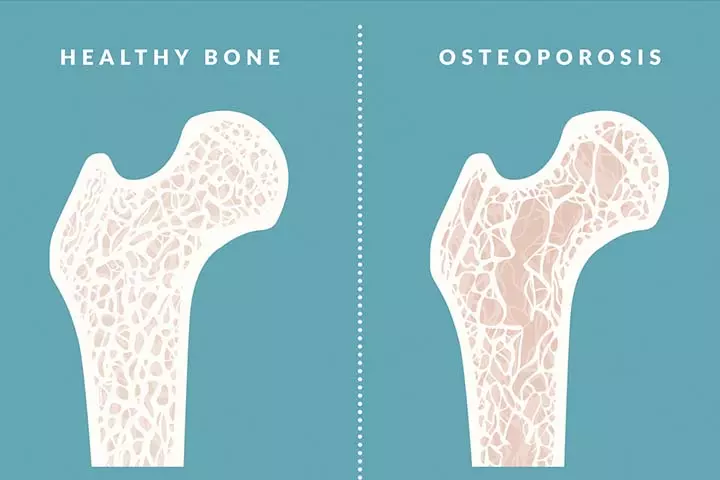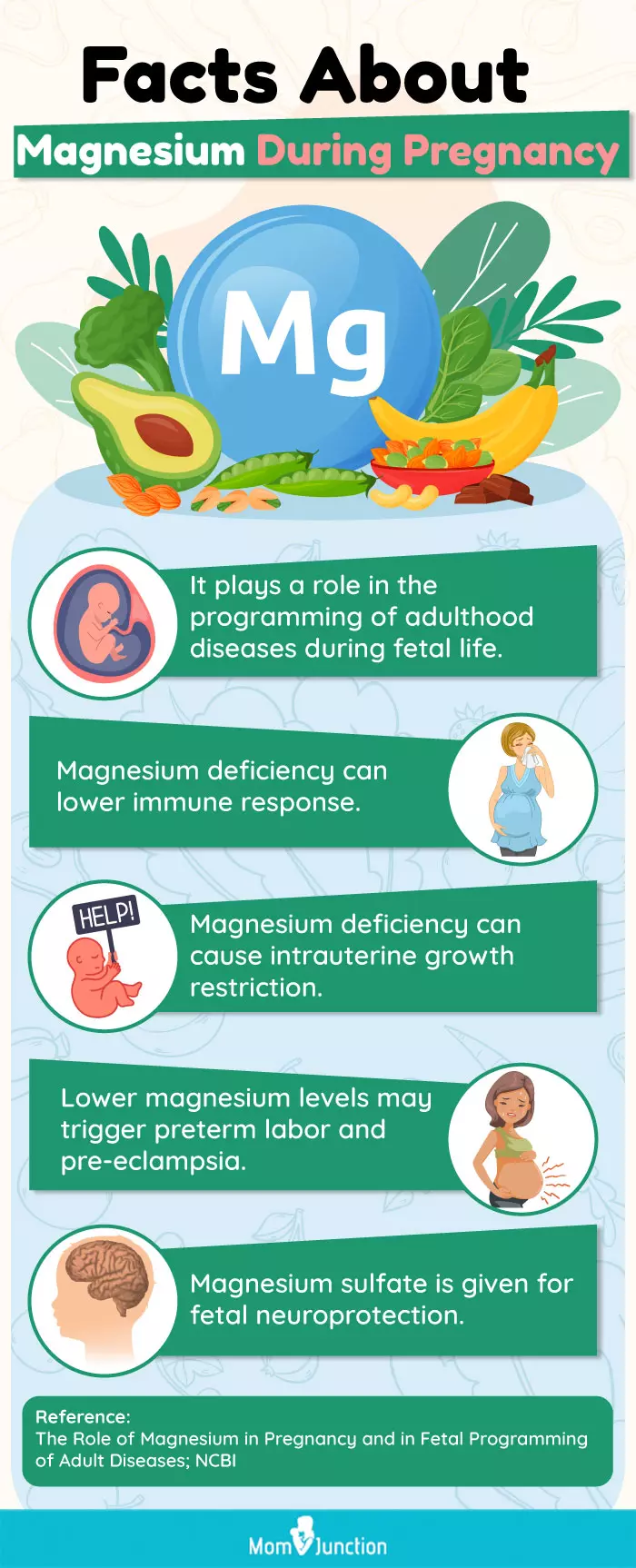
Image: iStock
Having magnesium during pregnancy is crucial because it helps in reducing the risks of preterm birth or labor and other assisted complications in pregnancy. Magnesium helps maintain the body’s blood sugar level and assists in building healthy teeth and bones (1). It also helps regulate the levels of cholesterol and maintain a steady heartbeat.

Additionally, magnesium is crucial for various biological functions, including energy production, cell replication, and protein synthesis (2). Studies have shown that the deficiency of magnesium during pregnancy might increase the risks of preeclampsiaiA condition characterized by high blood pressure that occurs during pregnancy and can be potentially dangerous. , infant mortality, or congenital disabilitiesiAnomalies occur before or at birth, often inherited. in the fetus (3). Read on to know more about the importance of magnesium and other related information in this post.
Key Pointers
- Maternal magnesium consumption benefits include relaxation of muscles, prevention of cramps, ease during labor, relief of nausea and aches, and improvement of bone and fetal health.
- Magnesium sulfate helps maintain blood pressure, sugar, and cholesterol levels while magnesium citrate acts as a laxative.
- Overdose of magnesium may lead to medical complications, including diarrhea and dehydration.
- Pregnant women can get their daily magnesium requirements from various foods such as almonds, spinach, avocado, edamame, soy milk, beans, and vegetables.
Why Is Magnesium Important During Pregnancy?
Other than the primary reasons mentioned above, there are more ways in which magnesium works for you and your baby.
- Works in conjunction with calcium: Both these minerals work together. While magnesium induces relaxation to the muscles, calcium stimulates muscle contractions (4). The right levels of magnesium can also keep the uterus from contracting until 35 weeks of pregnancy(5).
- Lowers the risk of osteoporosisiA condition in which the bones become brittle and weak. : Adequate levels of magnesium and calcium may help reduce the chance of bone damage later in life and promote bone health (6).

- Reduces cramps: Magnesium supplementation has been linked to various benefits, including reduced muscle soreness as well as a protective effect against muscle damage (7). It may also help with muscle function and cramps during pregnancy, though studies show mixed results (8). While some sources report relief from cramps and Braxton Hicks contractions with magnesium supplementation, more research is needed to fully understand its effects.
- Acts as a tranquilizer: Magnesium is the best remedy for busting stress and insomnia, which are quite common during pregnancy (9). Doctors usually prescribe it as a separate supplement apart from the prenatal vitamin/mineral supplements.
- Helps in delivery: This mineral optimizes blood pressure levels and improves the pain tolerance threshold, possibly making your delivery more comfortable (10) (11).
- Curbs nausea: Magnesium can treat nausea, which is the most common sickness along with morning sickness.

- Treats headaches: Magnesium supplementation may lessen the incidence of migraine headaches during pregnancy. It helps in relaxing constricted blood vessels in the brain, preventing lactic acid buildup, which may otherwise cause tension and migraine pain (12).
- Lowers risk of cerebral palsy: According to a review published in Australia, magnesium sulfate, when given to mothers who are at risk of preterm labor, helped in protecting their babies from cerebral palsy and also supported nervous system development (13).
 Quick fact
Quick factEffects Of Magnesium On The Baby
Research studies have revealed that intake of magnesium during pregnancy will either show a positive benefit or no benefit to the baby.
- Magnesium supplementation shows a beneficial effect on the growth of the fetus (15).
- Oral magnesium supplementation improves fetal circulation (16).
- Newborns who had better sleep and wake cycles came from mothers who had taken sufficient magnesium while pregnant.
- Research suggests that antenatal magnesium sulfate helps in neuroprotection, reducing the risk of cerebral palsy in preterm infants (17).
- It also appears to have a protective effect on intestinal morbidities that may require surgery in preterm infants (18).

How Much Magnesium Do You Need During Pregnancy?
The recommended daily allowance of magnesium during pregnancy is 350 to 360 milligrams. If you are between 19 and 30 years, you require 350mg, and if you are 31 years and above, you need 360mg (19). Vomiting, nausea, and food aversions during pregnancy may make you deficient in magnesium. Therefore, supplementation may be necessary apart from including magnesium-rich foods in your diet.
 Quick tip
Quick tipMagnesium-Rich Foods For Pregnant Women

To supplement your body with the recommended magnesium dosage, you should eat a healthy diet. Many plant and animal sources rich in magnesium include leafy greens (spinach), whole grains, seeds, legumes, breakfast cereals, foods containing dietary fiber, and fortified foods. Processed foods are a less optimal choice. Also, the magnesium in water alters from 1mg to 120mg per liter.
The following table gives you an idea of what foods can be included as a part of a magnesium-rich diet.
| FOOD MILLIGRAMS | (MG) PER SERVING | Percent DV* |
|---|---|---|
| Almonds, dry roasted, 1 ounce | 80 | 20 |
| Spinach, boiled, ½ cup | 78 | 20 |
| Cashews, dry roasted, 1 ounce | 74 | 19 |
| Peanuts, oil roasted, ¼ cup | 63 | 16 |
| Cereal, shredded wheat, 2 large biscuits | 61 | 15 |
| Soymilk, plain or vanilla, 1 cup | 61 | 15 |
| Black beans, cooked, ½ cup | 60 | 15 |
| Edamame, shelled, cooked, ½ cup | 50 | 13 |
| Peanut butter, smooth, 2 tablespoons | 49 | 12 |
| Bread, whole wheat, 2 slices | 46 | 12 |
| Avocado, cubed, 1 cup | 44 | 11 |
| Potato, baked with skin, 3.5 ounces | 43 | 11 |
| Rice, brown, cooked, ½ cup | 42 | 11 |
| Yogurt, plain, low fat, 8 ounces | 42 | 11 |
| Breakfast cereals, fortified with 10% of the DV for magnesium | 40 | 10 |
| Oatmeal, instant, 1 packet | 36 | 9 |
| Kidney beans, canned, ½ cup | 35 | 9 |
| Banana, 1 medium | 32 | 8 |
| Salmon, Atlantic, farmed, cooked, 3 ounces | 26 | 7 |
| Milk, 1 cup | 24–27 | 6–7 |
| Halibut, cooked, 3 ounces | 24 | 6 |
| Raisins, ½ cup | 23 | 6 |
| Chicken breast, roasted, 3 ounces | 22 | 6 |
| Beef, ground, 90% lean, pan broiled, 3 ounces | 20 | 5 |
| Broccoli, chopped and cooked, ½ cup | 12 | 3 |
| Rice, white, cooked, ½ cup | 10 | 3 |
| Apple, 1 medium | 9 | 2 |
| Carrot, raw, 1 medium | 7 | 2 |
Source: National Institute of Health
Weave your menu plan around these food items to make sure you are getting enough magnesium for you and your baby!
 Did you know?
Did you know?Do You Need Magnesium Supplements?
It is very tempting to just pop in a few supplements instead of watching what we eat. But is magnesium supplement a good idea?
Anything in excess can harm your body. You should take magnesium supplements only if your diet isn’t giving you enough magnesium. But never self-medicate. Always consult your doctor and take the supplements only if they recommend. They can offer advice tailored to your diet and health needs. In fact, many doctors prescribe them as a part of the prenatal vitamin package.
Are There Any Side Effects To Magnesium Supplements?
The chance of consuming too much magnesium through food is slim. But when you use supplements, you run the risk of magnesium overdose. Here are some side effects that may come with too much magnesium through supplements (19)(22).
1. Diarrhea and dehydration
Magnesium supplements can cause intestinal irritation in some pregnant women. This can lead to diarrhea, abdominal cramping, and appetite loss. Untreated diarrhea can even lead to dehydration – a serious concern during pregnancy. Magnesium carbonate, chloride, gluconate, and oxide are the forms of magnesium most commonly linked to diarrhea. If you are on magnesium supplements and are experiencing diarrhea for two to three days, talk to your doctor.
2. Stomach upset
The last thing you need during pregnancy is nausea and vomiting – morning sickness provides enough of that! But magnesium intake can lead to digestive issues that mimic morning sickness. These symptoms subside within hours of treatment but if they persist, seek medical advice.
3. Medication interactions

Magnesium supplements are known to interact with certain medications. If you are on antibiotics, blood pressure medication, calcium channel blockers, diabetes medication, etc., talk to your doctor before you start the supplements. Always review all medications and supplements you are taking during pregnancy, with your doctor.
4. Overdose
If you experience any of the following symptoms after consuming magnesium supplements, head to the ER. Magnesium overdose can be fatal if not treated on time.
Symptoms to look out for:
- Persistent vomiting
- Irregular heart rate
- Difficulty breathing
- Muscle weakness
- Low blood pressure
- Confusion
During pregnancy, your body needs that little extra care and nourishment. But you don’t always need to grab OTC medication and supplements to meet these needs. Try your best to eat healthy and keep in touch with your doctor. Moving further, let’s understand magnesium salts, and how they are useful in pregnancy.
Magnesium Sulfate During Pregnancy
Magnesium sulfate, a magnesium salt, is prescribed to prevent premature birth and decrease uterine tone.
What are its functions?
Magnesium sulfate is available in two forms – white powder for oral intake, and solution form for intravenous and intramuscular injections (23).
Oral suspension is usually given for treating constipation and cholecystitis (inflammation of the gallbladder). It has a laxative effect. It is, therefore, useful for bowel cleansing in the case of diagnostic procedures, and in cases of poisoning.
The intravenous or intramuscular administration is prescribed for lowering blood pressure and dilating blood vessels. According to a report by the Centers for Disease Control and Prevention (CDC), the overall prevalence of hypertensive disorders of pregnancy during the combined years of 2017-2019 was 14.6% (24).
Magnesium sulfate has a diureticiA substance that helps remove salt and water from the body. property, and, therefore, helps excrete fluids from the body. It also lowers the uterine tone during pregnancy. Magnesium intravenous drip therapy is prescribed for the following conditions in pregnancy (25) (26):
- Increased uterine tone
- Gestational Hypertension
- Preeclampsia associated with seizures
- Swelling
- ThrombosisiWhen blood clots block veins or arteries.
- To induce sedative effect
- Magnesium deficiency
Beware:
- Magnesium sulfate is not advisable during the first trimester.
- Also, there is no proper evidence showing that it is completely safe during pregnancy.
- It can only be taken upon doctor’s prescription.
Are there any side effects?
Magnesium therapy is only used for a short period of three to seven days. If it is a long-term treatment, it may accumulate in your body causing respiratory failure and hypoxiailow level of oxygen in the body tissues. in the fetus. It may also subject calcium to a process of leaching from the fetal bone tissue causing fractures in the newborn during labor. Hence, you should stop taking magnesium sulfate supplements before labor (27).
A study evaluated the use of magnesium sulfate supplementation in pregnant women to manage eclampsia. The study reported, “Between January 2000 and February 2009, a total of 6654 women with preeclampsia were treated with intravenous magnesium sulfate as described; 88 (6%) of the infants were diagnosed with hypotonia. Lower 1-minute and 5-minute Apgar scores, intubation in the delivery room, admission to special care nursery, and hypotonia were all significantly increased as maternal serum magnesium concentrations increased before birth (28).”
Obstetrician and gynecologist Dr. Himali Maniar Patel says, “Consuming magnesium in excess can result in side effects such as diarrhea, nausea, and abdominal cramping. Extremely high doses may result in more severe conditions, such as magnesium toxicity, which can be harmful to both the mother and the fetus.”
 Experts say
Experts sayMagnesium Citrate During Pregnancy
This is another salt of magnesium. It is FDA-approved and falls under category C, which means there are not enough studies to put it in a different category.
- It is a saline laxative that improves bowel movements and an osmotic laxative, meaning it retains water in the stools (30).
- It is also prescribed to patients undergoing colonoscopy or other surgeries.
- You should consult your doctor before using magnesium citrate in pregnancy, and use it only with your doctor’s approval.
Frequently Asked Questions
1. What is the role of magnesium oxide during pregnancy?
Magnesium oxide is an FDA approved magnesium supplement that is safe to take in prescribed amounts. It is used as a supplement and laxative during pregnancy (31).
The US National Institutes of Health advises not to take it for a longer period without getting approval from the doctor (19).
2. Can you take magnesium hydroxide during pregnancy?
Magnesium hydroxide (milk of magnesia) is not approved by the FDA in the pregnancy category. There are no controlled studies regarding the usage of this drug during pregnancy. Though a laxative, it can only be taken under doctor’s supervision.
3. What are the other magnesium supplements the doctor usually suggests in pregnancy?
Magnesium malate and magnesium glycinate are two other supplements which are prescribed during pregnancy. All of these magnesium salts would only be given when the benefits outweigh the risks.
4. Is magnesium oil safe during pregnancy?
Magnesium oil is another safe option during pregnancy and helps in treating the symptoms of preeclampsia. The oil is absorbed through the skin, and it will not pass into the digestive tract. It can be used as a lotion, which you can leave on the skin. You can use 15ml to apply on the skin or add it to warm water for a body soak. About 120ml can be used for a bath. Unlike the oral magnesium salts with the laxative property, the oil will not cause any digestive stress.
5. Do prenatal vitamins have magnesium?
Magnesium is usually not a part of prenatal vitamins. However, it is essential to maintain proper maternal health during pregnancy. Most prenatal vitamins provide minerals and vitamins such as calcium, iron, vitamin A, vitamin B (B1, B5, B6, B7, B12, and folate), vitamin C, vitamin E, vitamin D, and micronutrients like selenium (32) (33). However, these are to be taken after a doctor’s consent during pregnancy.
6. What are the symptoms of magnesium deficiency during pregnancy?
The symptoms of magnesium deficiency during pregnancy may resemble common pregnancy symptoms. Pregnant women may experience muscle cramps, fatigue, nausea, vomiting, and headaches. Some may also develop anxiety and depression. More severe signs might include an irregular heartbeat and elevated blood pressure (34).
Magnesium during pregnancy is essential for mothers’ health for many reasons, including reducing cramps, treating nausea, and improving pain tolerance. However, it is likely to have little or no benefit for the baby. You should include magnesium supplements and magnesium-rich foods in your pregnancy diet, but take them in moderation as both deficiency and excessive consumption may adversely affect your pregnancy. Therefore, keep note of any magnesium supplements you take and consult your doctor before starting any new drugs or supplements.
Infographic: What You Should Know About Magnesium During Pregnancy?
Magnesium is an essential nutrient that plays a vital role in cellular functions. Lower levels of magnesium during pregnancy could interfere with normal fetal development. Go through the infographic to learn facts about magnesium during pregnancy. Illustration: Momjunction Design Team
Illustration: Magnesium During Pregnancy: Why You Should Take It And How Much

Image: Dall·E/MomJunction Design Team
References
- Mario barbagallo et al.; (2003); Role of magnesium in insulin action, diabetes and cardio-metabolic syndrome X.
https://pubmed.ncbi.nlm.nih.gov/12537988/ - R. Swaminathan; (2003); Magnesium metabolism and its disorders.
https://www.ncbi.nlm.nih.gov/pmc/articles/PMC1855626/ - Jean Durlach; (2004); New data on the importance of gestational MG deficiency.
https://pubmed.ncbi.nlm.nih.gov/15637217/ - Understanding the Balance between Magnesium, Calcium and Vitamin D.
https://grassrootshealth.org/blog/understanding-balance-magnesium-calcium-vitamin-d/ - H S Deeksha et.al; (2025); Study Based on the Alliance Between Serum Magnesium Levels and Preterm Labor: An Inclusive Review.
https://pmc.ncbi.nlm.nih.gov/articles/PMC10460502/ - Sara Castiglioni et al.; (2013); Magnesium and osteoporosis: current state of knowledge and future research directions.
https://www.ncbi.nlm.nih.gov/pmc/articles/PMC3775240/ - Maria Grazia Tarsitano et.al; (2025); Effects of magnesium supplementation on muscle soreness in different type of physical activities: a systematic review.
https://translational-medicine.biomedcentral.com/articles/10.1186/s12967-024-05434-x - Scott R Garrison et.al; (2025); Magnesium for skeletal muscle cramps.
https://pmc.ncbi.nlm.nih.gov/articles/PMC8094171/ - Gisèle Pickering et.al; (2025); Magnesium Status and Stress: The Vicious Circle Concept Revisited.
https://pmc.ncbi.nlm.nih.gov/articles/PMC7761127/ - Mark Houston; (2011); The Role of Magnesium in Hypertension and Cardiovascular Disease.
https://pmc.ncbi.nlm.nih.gov/articles/PMC8108907/ - The role of magnesium in pain.
https://www.ncbi.nlm.nih.gov/books/NBK507245/ - Jessica C. Schoen et.al; (2015); Headache in pregnancy: an approach to emergency department evaluation and management.
https://www.ncbi.nlm.nih.gov/pmc/articles/PMC4380381/ - Magnesium sulphate protects babies against cerebral palsy.
https://www.adelaide.edu.au/news/news31441.html - Lynne M. Dalton et al.; (2016); Magnesium in pregnancy.
https://academic.oup.com/nutritionreviews/article/74/9/549/1752003 - M. Rudnicki et al.; (1990); Magnesium supplement in pregnancy-induced hypertension. A clinicopathological study.
https://pubmed.ncbi.nlm.nih.gov/2282207/ - F. Facchinetti et al.; (1992); Oral magnesium supplementation improves fetal circulation.
https://pubmed.ncbi.nlm.nih.gov/1467155/ - Emily S Shepherd et.al; (2025); Magnesium sulphate for women at risk of preterm birth for neuroprotection of the fetus.
https://www.cochranelibrary.com/cdsr/doi/10.1002/14651858.CD004661.pub4/full - Seh Hyun Kim et.al; (2025); Antenatal magnesium sulfate and intestinal morbidities in preterm infants with extremely low gestational age.
https://www.sciencedirect.com/science/article/pii/S1875957220302229 - Magnesium.
https://ods.od.nih.gov/factsheets/Magnesium-HealthProfessional/ - J Behar; (1975); Effect of calcium on magnesium absorption.
https://pubmed.ncbi.nlm.nih.gov/1211491/ - Foods high in magnesium.
https://www.healthdirect.gov.au/foods-high-in-magnesium - Magnesium.
https://www.mountsinai.org/health-library/supplement/magnesium - Magnesium Sulfate.
https://www.ncbi.nlm.nih.gov/books/NBK554553/ - Hypertensive Disorders in Pregnancy and Mortality at Delivery Hospitalization — United States, 2017–2019.
https://www.cdc.gov/mmwr/volumes/71/wr/mm7117a1.htm - Anna G Euser and Marilyn J Cipolla; (2009); Magnesium sulfate treatment for the prevention of eclampsia: A brief review.
https://pmc.ncbi.nlm.nih.gov/articles/PMC2663594/ - Reinaldo Marín et.al; (2025); Magnesium salts in pregnancy.
https://www.sciencedirect.com/science/article/pii/S2773050623000241 - Magnesium sulfate (MgS04) in pregnancy.
https://www.gloshospitals.nhs.uk/media/documents/Magnesium_sulfate_MgS04_in_pregnancy_GHPI1373_04_20_1.pdf - Mina Abbassi-Ghanavati et.al; (2012); Neonatal effects of magnesium sulfate given to the mother.
https://pubmed.ncbi.nlm.nih.gov/22773290/ - FDA recommends against prolonged use of magnesium sulfate to stop preterm labor due to bone changes in exposed babies.
https://www.fda.gov/media/85971/download - Magnesium Citrate and Oxide: Benefits, Dosage and Side Effects.
https://www.dietvsdisease.org/magnesium-citrate-oxide-benefits-dosage/ - Magnesium oxide pregnancy and breastfeeding warnings.
https://www.drugs.com/pregnancy/magnesium-oxide.html - Prenatal Vitamins.
https://americanpregnancy.org/healthy-pregnancy/pregnancy-health-wellness/prenatal-vitamins/ - Selenium
https://ods.od.nih.gov/factsheets/Selenium-HealthProfessional/ - Magnesium deficiency.
https://www.healthdirect.gov.au/magnesium-deficiency
Community Experiences
Join the conversation and become a part of our nurturing community! Share your stories, experiences, and insights to connect with fellow parents.
Read full bio of Claudia Wilson
- Dr. Himali M Patel is an Ahmedabad, India based gynecologist with 13 years of experience. She currently practices at Nisha Women's Hospital and IVF Centre. Dr. Patel did her graduation in Medicine at Bharati Vidyapeeth University, Pune and holds a diploma in Obstetrics and Gynecology.
 Dr. Himali M Patel is an Ahmedabad, India based gynecologist with 13 years of experience. She currently practices at Nisha Women's Hospital and IVF Centre. Dr. Patel did her graduation in Medicine at Bharati Vidyapeeth University, Pune and holds a diploma in Obstetrics and Gynecology.
Dr. Himali M Patel is an Ahmedabad, India based gynecologist with 13 years of experience. She currently practices at Nisha Women's Hospital and IVF Centre. Dr. Patel did her graduation in Medicine at Bharati Vidyapeeth University, Pune and holds a diploma in Obstetrics and Gynecology.
Read full bio of Rebecca Malachi
Read full bio of Swati Patwal
Read full bio of Aneesha Amonz

















